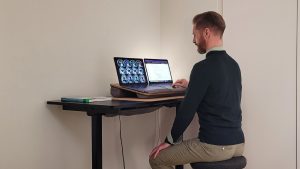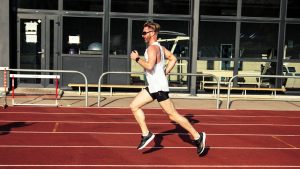21.4.2023: Andrius Penkauskas: How Your Profession Can Shape Your Lifestyle: Insights from a Researcher’s Perspective
Andrius Penkauskas: How Your Profession Can Shape Your Lifestyle: Insights from a Researcher’s Perspective
Have you ever considered how your profession can shape your lifestyle? It is common for work-related habits to leak into your personal life, especially in today’s post-pandemic world, where the boundaries between work and private life are blurred. There is an ever-growing discussion related to this topic. While “work-life balance” has become a buzzword in the mainstream media, describing the challenge of balancing career and personal demands, psychologists warn against the potential negative impact of a continuous blending of private and professional life.
Even though the polarization between work and personal life is undeniably fascinating, I feel there is more to it. Therefore, a step back might give a better view of this issue from a more holistic perspective. Instead of considering work and individual life as opposites on the spectrum, it might be worth considering them as complementary parts of a greater whole. That is why I am excited to share my thoughts on this form of synergy. Although it is important to note that my perspective on this topic is subjective, so take it with a grain of salt. However, if you remain intrigued, I am eager to share it with you, hoping it will tickle your thoughts.
The Power of Methodological Approaches
In a previous blog post, I shared some significant shifts in my career and how they led to the multidisciplinary approach I follow. While this attitude is an overarching strategy, this time, I would like to explore some of the other details and methods that arise from my profession. I have a background in a few scientific disciplines, which led to a doctoral researcher position at the University of Eastern Finland, where I am a part of the Neuro-Innovation program. Working in the scientific field rendered methodological approaches not just the bread and butter of my profession but also a part of my everyday life.
As a researcher, I follow five crucial methods: empirical, reproducible, provisional, objective, and systematic. These elements have not only become integral to my daily work but have also had a profound impact on my attitudes, behaviours, and choices. Scientific rigour has a two-fold effect on my daily life: methodological and knowledge-based. Even though there is fascinating knowledge from the computational neuroscience field that I could share, today, I would like to concentrate on the significance of methodology.

For instance, the systematic approaches I use in my research have spilt over into my personal life, helping me organize my tasks and prioritize my goals. The empirical and objective nature of my profession has taught me to approach issues with an open mind as well as value evidence over assumptions. In addition, the endeavour of replicability and reproducibility has instilled a sense of consistency and responsibility, ensuring that I follow through on my commitments and replicate successful actions in the future. Finally, the provisional viewpoint has taught me to remain open-minded and adaptable to new information, that is essential for my continuous personal growth.
How David A. Sinclair and Andrew D. Huberman Transformed My Life
Having provided a general overview of how work impacts my life, let us delve into more practical and detailed examples. I am excited to discuss the work of two scientists and how it influenced my day-to-day life. But, before starting, we must clarify that this post is my opinion, not an advertisement.
Researchers David A. Sinclair and Andrew D. Huberman actively share their research, insights, and expertise on cognition, nutrition, health, and human performance topics. What I admire about their work is that it is not only in research papers or books but also in other formats, such as podcasts and interviews. This diversity allows flexibility in choosing the level of content complexity, making it easier to integrate it into both focused study and leisure activity. Despite the abundance of content available on the internet, it is crucial to emphasize the importance of relying on reliable sources. It is essential to follow public figures or scholars whose work is evidence-based and includes references because it helps to weed out clickbait, opinion-based, controversial, or misleading information.
David A. Sinclair is well-known for his research on ageing and epigenetics. His findings have implications for ageing-related health and vitality maintenance. Sinclair has also authored the book “Lifespan,” where he discusses why we age and why we do not have to. His work has shed light on the mechanics of the mitochondria, which generate most of the chemical energy needed to power the cell’s biochemical reactions, the significance of fasting intervals in boosting the body’s anti-ageing defences and the role of specific nutrients and supplements, such as polyphenols and resveratrol, in promoting cellular health and longevity.
His work has motivated me to include more whole foods in my regular diet and enhance them with supplements. It also encouraged an active effort to cut down on processed and sugary foods. In addition to these adjustments, I reevaluated some of my daily routines and eating patterns and modified them accordingly. These lifestyle changes, while initially challenging, made a significant positive impact on my physical state. I noticed an increase in my energy levels and an overall improvement in my physical condition.
On the other hand, Andrew D. Huberman is a renowned neuroscientist who focuses on researching the brain and how it affects our behaviour and well-being. His work has practical applications in everyday life, such as stress management, improved sleep quality, and enhanced cognitive function. Huberman’s findings and insights on regulatory hormones such as cortisol, adrenaline, and melatonin have helped to optimize my productivity and rest patterns. In addition, in his podcasts, Huberman shared simple yet effective mind and attention exercises.
These activities have been instrumental in helping me to develop better concentration, allowing me to handle challenging jobs with greater focus and clarity. Overall, Huberman’s research has been a game-changer for my daily life, aiding me with practical tools and strategies to optimize some of my mental functions and behavioural patterns.
The above-described lifestyle adjustments are even more intriguing because they not only enhanced my mental and physical well-being but also had a positive impact on my endurance running. I noticed increased performance, faster recovery after runs, and a better focus on achieving my running goals. It was a positive feedback loop, where taking care of my health and well-being through these practices led to better results in activities I like, which reinforced me to continue these habits.

David A. Sinclair and Andrew D. Huberman advocate for a proactive approach to wellness and health, and I find plenty of reasons to do so. By following their research and advice, I made informed decisions that improved my quality of life. However, implementing scientific recommendations requires effort, motivation, attention to procedures, and consistency. Fortunately, as a researcher, I am accustomed to these methods and find them comfortable to follow. Although this leads my personal life to become more methodological and less spontaneous while mirroring some of my professional work practices, the intersection of these aspects serves the greater good. This synergy emphasizes the value of incorporating work-related patterns into my lifestyle. However, it is critical to find a balance between these two ingredients.
Your mileage may vary, and I encourage you to take some time to reflect on how your profession affects your well-being. It may help to reveal something worth embracing or removing from your daily life.
P.S. If you find this blog interesting, stay tuned, and I will write to you in the future.